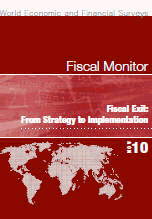
Typical street scene in Santa Ana, El Salvador. (Photo: iStock)
IMF Survey: Governments Launch Plans to Reduce Debt and Boost Growth
November 4, 2010
- Deficits are projected to fall for most countries in 2011
- Policies to reduce deficits and debt accumulation take shape
- Countries' different needs depend on financial markets, deficits, debt burdens
Many governments have outlined their plans over the next few years to help reduce their countries’ deficits and improve prospects for long-term economic growth. Some countries have already begun to cut back, and by next year nine out of ten will be reducing their deficits, the IMF says in a new study.

Pedestrians in New York City, United States: advanced economies have begun to cut spending to bring debt and deficits under control (photo: Newscom)
DEBT AND SPENDING
The IMF said the current pace strikes the right balance between reassuring financial markets concerned about mounting government debt, and avoiding an abrupt withdrawal of support for the fragile global recovery.
The pace of spending cutbacks is different for countries depending on both the strength of pre-crisis government finances and the amount of financial market pressures they face. Countries with higher deficits in 2009, or that are facing higher borrowing costs, are adjusting faster than others.
Many countries’ deficits have fallen in the past year, mostly as a result of improved economic conditions, including lower needs to support the financial sector, and collectively countries’ deficits are projected to decline to 6 and 5 percent of GDP in 2010 and 2011 respectively, from 6¾ percent in 2009, according to the IMF.
However public debt ratios are still rising, government financing needs continue to be high in advanced economies, and risks remain.

The IMF’s latest issue of the Fiscal Monitor, an analysis of public finance developments from around the world (photo: IMF)
The IMF Fiscal Monitor: Fiscal Exit – From Strategy to Implementation analyzes fiscal developments in advanced, emerging market, and low-income economies, explains why the pace of deficit reduction and debt accumulation varies across advanced economies, and examines financing requirements and policy options across economies.
During the IMF-World Bank Annual Meetings in Washington, D.C. in early October, IMF chief Dominique Strauss-Kahn said fiscal sustainability remains a problem for some countries, particularly those that entered the crisis with high levels of debt. He said in countries where the recovery remains fragile, and private sector demand is weak, government support may still be needed depending on individual country circumstances.
“Consolidate as much as you have to, and stimulate as much as you can,” said Strauss-Kahn.
Governments need to set debt goals
If countries do not bring down high post-crisis debt levels over the long run, they risk high interest rates, low private investment and growth, and fewer policy options to boost their economies in the face of another economic downturn, the IMF said.
A review of 25 advanced and emerging market economies conducted in the Fiscal Monitor finds that while most have produced plans aiming to bring down their deficits in the coming years, many countries could do more, including
• Provide details beyond 2011 on measures to reduce deficits and debt accumulation
• Control health care and pension spending, which is projected to rise significantly in advanced economies in the coming years
• Strengthen the institutions charged with government budgets, revenues, and spending, and, where appropriate, introduce or strengthen fiscal rules and independent fiscal agencies to guide policy
• Improve targeting of social safety net spending on the most vulnerable groups in society
• Establish a long-run goal for their public debt ratio.
Different countries, different speeds
The pace of fiscal adjustment across countries depends on differences in countries’ 2009 debt levels and financial market pressures, according to the IMF.
Economic growth and lower financial sector support are projected to lead to a decline in the overall deficit in advanced economies of about ¾ percent of GDP in 2010. Excluding the effects of these two factors, the deficit is projected to rise by about ½ percent of GDP.
By contrast, policies to reduce deficits will be a key factor in the projected decline in the overall deficit of advanced economies by about 1¼ percent of GDP in 2011, which is about 1 percent of GDP after controlling for the impact of economic growth on the budget.
Overall, emerging market economies strengthened their fiscal positions in 2010, although this owes much to the recovery of growth in those countries. The fiscal position is expected to improve further in emerging markets in 2011, reflecting a tightening of fiscal policies in many countries. Deficits are also expected to decline this year and next in low-income economies, after expanding rapidly in 2009 when fiscal policy was loosened in response to the global crisis.







